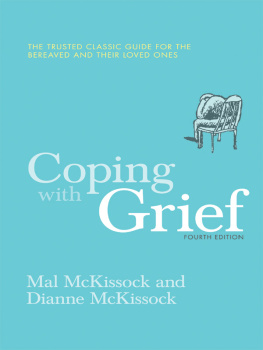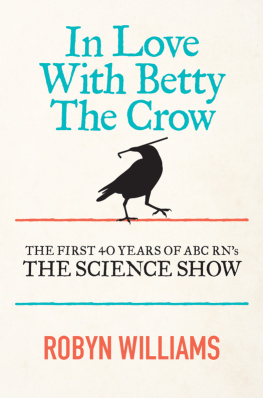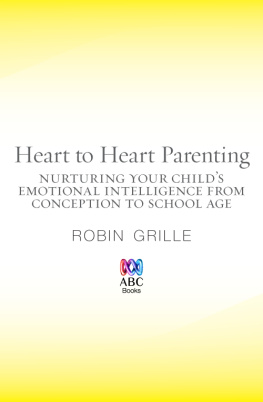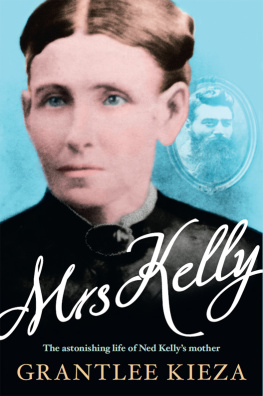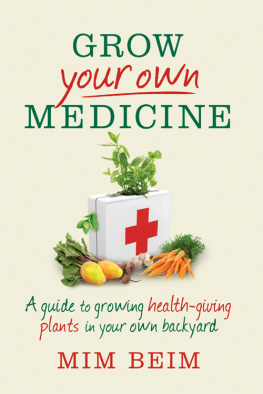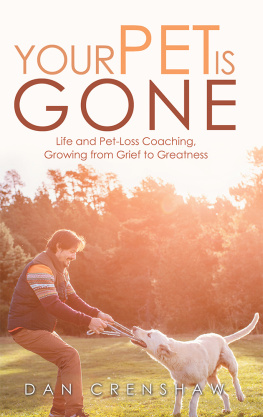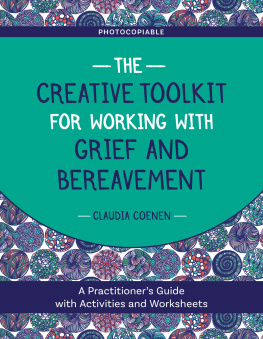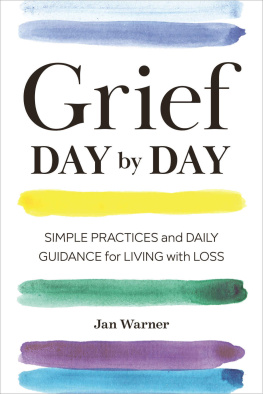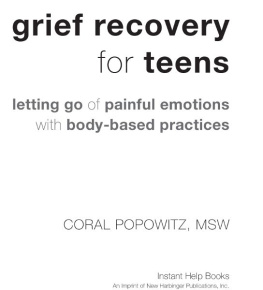Australian Broadcasting Corporation. - Coping With Grief
Here you can read online Australian Broadcasting Corporation. - Coping With Grief full text of the book (entire story) in english for free. Download pdf and epub, get meaning, cover and reviews about this ebook. City: Crows Nest;N.S.W, year: 2012, publisher: ABC Enterprises, genre: Home and family. Description of the work, (preface) as well as reviews are available. Best literature library LitArk.com created for fans of good reading and offers a wide selection of genres:
Romance novel
Science fiction
Adventure
Detective
Science
History
Home and family
Prose
Art
Politics
Computer
Non-fiction
Religion
Business
Children
Humor
Choose a favorite category and find really read worthwhile books. Enjoy immersion in the world of imagination, feel the emotions of the characters or learn something new for yourself, make an fascinating discovery.
- Book:Coping With Grief
- Author:
- Publisher:ABC Enterprises
- Genre:
- Year:2012
- City:Crows Nest;N.S.W
- Rating:3 / 5
- Favourites:Add to favourites
- Your mark:
- 60
- 1
- 2
- 3
- 4
- 5
Coping With Grief: summary, description and annotation
We offer to read an annotation, description, summary or preface (depends on what the author of the book "Coping With Grief" wrote himself). If you haven't found the necessary information about the book — write in the comments, we will try to find it.
Australian Broadcasting Corporation.: author's other books
Who wrote Coping With Grief? Find out the surname, the name of the author of the book and a list of all author's works by series.
Coping With Grief — read online for free the complete book (whole text) full work
Below is the text of the book, divided by pages. System saving the place of the last page read, allows you to conveniently read the book "Coping With Grief" online for free, without having to search again every time where you left off. Put a bookmark, and you can go to the page where you finished reading at any time.
Font size:
Interval:
Bookmark:

Most of us will experience grief at some stage of our lives and although grief is most closely associated with coping with the loss of someone close to usa spouse, a family member, a close friendthrough death, we also experience grief in response to other losses in lifea job, a close relationship, our health.
In the preliminary research for the ABCs six-part radio series Step by StepCoping with Grief (one of the first of the Continuing Education series to be produced by ABC Education) it became clear to the production team that few people have any preparation for handling grief or are equipped to support family and friends at times of grief and personal loss.
Researcher and interviewer Julia Lester spoke with a number of people who told of how they felt as they worked, often blindly, through the grieving process. So often the contributors told of feelings which were frightening and painful, odd and even bizarre. With valuable input from bereavement educators and others whose professional work brings them into close contact with people trying to cope with grief and loss, the series showed that many of these feelings and responses to grief are very normal, and part of the process which must be worked through to resolve grief.
Bereavement Counsellor and Educator Mal McKissock was one of the professional people who made a significant contribution to the series. I am pleased that he has written this book which provides a concise and valuable means of furthering our understanding of the experience and process of coping with grief and loss.
TONY RYAN
Executive Producer
The experience of grief in response to loss is known to all human beings regardless of age, gender, creed or culture. Extremes of grief tend to be experienced when we lose a close and meaningful relationship through divorce, separation, estrangement or death. We may also grieve the loss of a limb, ability, appearance, country, home, meaningful occupation, trust or lifestyle.
Responses to all losses have many characteristics in common, but it is generally agreed that death is the most significant loss for most of us, perhaps because of its finality and confrontation with our own finiteness.
Whatever the cause of loss, there is little benefit in making comparisons of worseness. Grief is a subjective experience and most of us feel little benefit in being told there is someone worse off than ourselves. We can only feel our own pain. For example, if I have a toothache or migraine, I am unlikely to find comfort in being told that someone else has a worse one.
While this book focuses on grief following bereavement, people grieving other losses may be able to identify with many of the reactions and responses described.
In our society, people tend to be intolerant of strong reactions to pain. After a very short time, even after a sudden or traumatic death, others may use clichs to placate feelings and say things like buck up, think of the kids, every cloud has a silver lining, its Gods will, he/she is in a better place, they wouldnt want you to be upset, youre young enoughyou can have another baby, you can get married again. While usually expressed from concern and a genuine belief that getting upset is bad for you, platitudes and clichs are designed, consciously or unconsciously, to prevent feelings being expressed.
If you do show distress openly, you may be described (or describe yourself) as breaking down, falling apart, cracking up or not coping. All of these terms are derogatory and patronising, and demonstrate a lack of understanding of the nature and process of grief. Conversely, if you demonstrate stoical restraint when someone you love has died you are likely to be described as brave, strong, courageous, holding yourself together or coping well. All of these expressions are examples of how language is used to prevent or control expression of feelings.
We all grieve as we have lived. For example, emotionally expressive people might become more expressive, those who dont show feelings openly may appear even more contained. Problems may occur when others try to force us to behave in ways that are comfortable for them, and not expressions of who we are. For example, when an expressive person is forced to contain emotion, they may later experience physical symptoms or even illness as a result.
This book gives an outline of the grieving process and some of the reactions that occur when we are bereaved, along with suggestions for managing grief so that unnecessary suffering is minimised. It is suitable for those supporting bereaved people, as well as for anyone who is grieving the death of someone they love.
Some of the ideas included may seem strange at first to those who have not experienced significant loss. However, they are based on many years of experience in working with bereaved people, and on personal experience of grief. They have the capacity to increase compassionate understanding, enhance relationships, and facilitate the bereaved persons ability to learn how to live with grief.
The language used in this book, whether sounding personal or more general, is meant to include us all. As mentioned earlier, grief is a great leveller, a common, human experience.
There are several basic principles to remember:
- It is normal and healthy to feel and express intense and painful emotions when grieving a significant loss.
- Expressions of grief help bereaved people learn how to live with loss.
- A bereaved person may experience a wide range of feelingsshock, sadness, anger, guilt, despair, as well as relief, hope and acceptance.
- Bereaved people do not grieve in stagesgrief is not linear, but is chaotican all over the shop experience.
- Painful feelings decrease in intensity over time if the bereaved person receives the kind of compassionate support that is right for them. If intensity does not abate after a significant period of time, that may be an indication that professional help may be required.
- A total absence of observable grief may also be an indication of the need for professional helpan emotional check-up.
- Bereaved people who have not been helped to express grief in ways that are right for them are likely to be more vulnerable to physical and psychological illness in the long term.
Before discussing common reactions of bereaved people, lets briefly talk about some common reactions of those in a supportive or caretaking role. It is normal, sensitive and empathic to feel helpless, to be filled with longing to find something to do or say that will make the bereaved person feel better. It is at this point of helplessness that many carers are likely to use platitudes such as its just a matter of time, words which are never found to be helpful to anyone. It is appropriate to feel pain when someone we love dies, and all that most of us need at these times is for a caring person to have the courage to stay and listen to how much it hurts, resisting any temptation to try to fix things, to make it all better.
Despite the comment above about time being used in a patronising way, time is an important aspect of grief.
Initially,
Time
stands still
weighs heavily
passes
heals .
This doesnt refer to the clichs mentioned earlier, but rather to a subjective, internal processsomeone elses words applied externally like a band aid cannot create healing. The process has to be experienced by each bereaved person in their own way.
Lets look for a moment at some of the other time factors associated with bereavement.
Font size:
Interval:
Bookmark:
Similar books «Coping With Grief»
Look at similar books to Coping With Grief. We have selected literature similar in name and meaning in the hope of providing readers with more options to find new, interesting, not yet read works.
Discussion, reviews of the book Coping With Grief and just readers' own opinions. Leave your comments, write what you think about the work, its meaning or the main characters. Specify what exactly you liked and what you didn't like, and why you think so.

